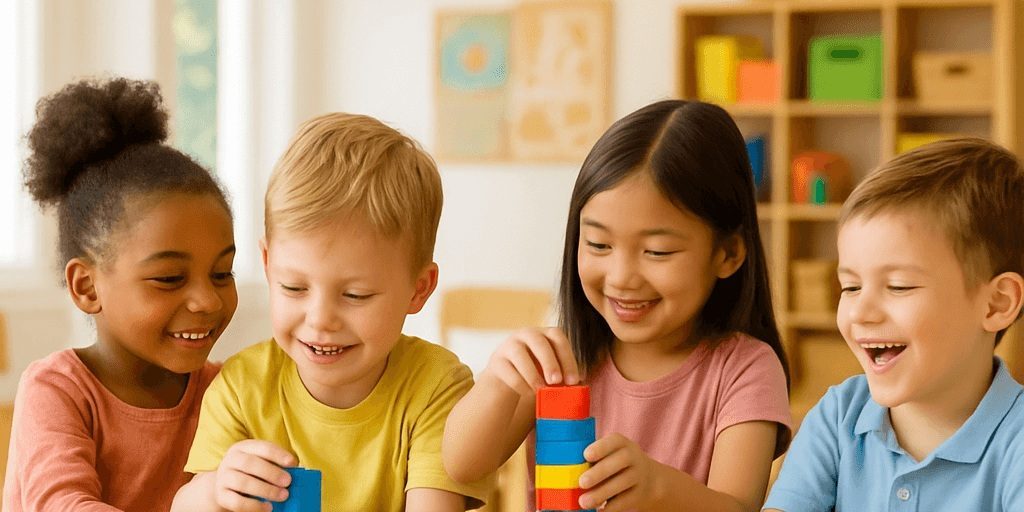Childcare offers daily opportunities for preschoolers to build confidence, communication skills and resilience in a supportive environment.
For many parents, one of the biggest questions when considering childcare is not just about supervision – it’s about how their child will grow socially and emotionally. The early years are a crucial stage for developing confidence, communication, and social understanding, which set the foundation for future success at school and beyond. High-quality childcare provides far more than a safe environment—it offers daily opportunities for tamariki (children) to connect, share, and thrive.
In this blog, we’ll explore the childcare benefits for social skills, look at confidence-building activities for preschoolers and explain why childcare is important for your child’s
development.
Why social skills matter in early childhood?
From the moment children begin interacting with others, they are learning important social behaviours. Skills such as sharing, listening, taking turns and expressing emotions are not just nice to have – they’re essential for navigating the wider world.
Research in early childhood education shows that children who develop strong social skills early on are more likely to form positive relationships with peers and teachers, adapt well to new environments (such as starting school), show empathy and cooperation and develop resilience when faced with challenges.
These abilities don’t develop in isolation. They grow when children interact with others in
meaningful ways – exactly what happens every day in a quality childcare environment.
Childcare benefits for social skills
Childcare is more than just care; it’s structured, play-based learning that encourages interaction. Here’s how it supports social development:
Learning through play
Play is the natural language of children. In childcare, tamariki engage in group activities – building blocks, role play, or outdoor adventures – that naturally teach teamwork, negotiation, and cooperation. For example, working together to build a sandcastle teaches problem- solving and turn-taking.
Exposure to diverse friendships
At home, children may interact mainly with siblings or close relatives. Childcare introduces them to a wider circle of peers, often from different cultural and family backgrounds. These diverse interactions broaden a child’s perspective, fostering acceptance, empathy, and respect for others.
Practicing communication every day
Whether it’s asking for help, sharing toys, or joining in group discussions, childcare provides endless opportunities for children to practice communication. Teachers also model positive behaviours, guiding children in expressing their feelings in healthy, respectful ways.
Building emotional intelligence
When conflicts arise – like two children wanting the same toy – teachers help children navigate those emotions. This builds emotional intelligence: the ability to recognise and manage feelings while understanding others’ perspectives.
Confidence-building activities for preschoolers
Confidence doesn’t happen overnight. It’s nurtured through encouragement, practice, and achievement. Here are some of the ways childcare helps build self-esteem:
Small responsibilities: Simple tasks, such as helping set the table for morning tea or tidying up toys, give children a sense of responsibility and pride. Achieving these small goals boosts self-confidence.
Group performances & storytelling: Activities like singing together, role-playing, or sharing a story with the group encourage children to step into the spotlight in a safe and supportive way. Over time, this helps shy children feel more comfortable expressing themselves.
Problem-solving challenges: Building puzzles, creating art projects, or tackling outdoor obstacle courses allows children to set goals and see results. These hands-on experiences reinforce the idea: “I can do it!”
Positive teacher guidance: Early childhood teachers play a huge role in building confidence. With gentle encouragement, they help children try new things, celebrate their achievements, and learn from mistakes without fear.
Why childcare is important for social growth?
While children can learn social skills at home, childcare accelerates and enhances this growth by providing structured, daily opportunities for practice. Here’s why it’s so valuable:
- Consistency matters: Social skills need repetition to stick. Daily childcare routines ensure children practice these skills regularly.
- Safe environment for mistakes: Childcare allows children to make social mistakes—like grabbing a toy or interrupting—and then learn the correct behaviour with guidance from teachers.
- Preparation for school: Children who attend childcare often transition to school more smoothly because they are already familiar with group settings, routines, and peer relationships.
- Community connections: Childcare connects families, creating a supportive network that benefits children beyond the classroom.
Final thoughts
Childcare is a powerful partner in raising confident, socially capable children. Through play, guidance, and daily practice, children learn how to make friends, express themselves, and face challenges with resilience. These are the building blocks for success in school – and in life.
So when you ask, “Why is childcare important?”, remember: it’s not only about convenience for parents – it is about giving children the social and emotional foundations they need to thrive.
Are you considering childcare for your little one? At Nature’s Point, we provide a nurturing, play-based environment where tamariki can grow in confidence, kindness, and joy. Book a visit contact-us today and see how we support every child’s journey.




